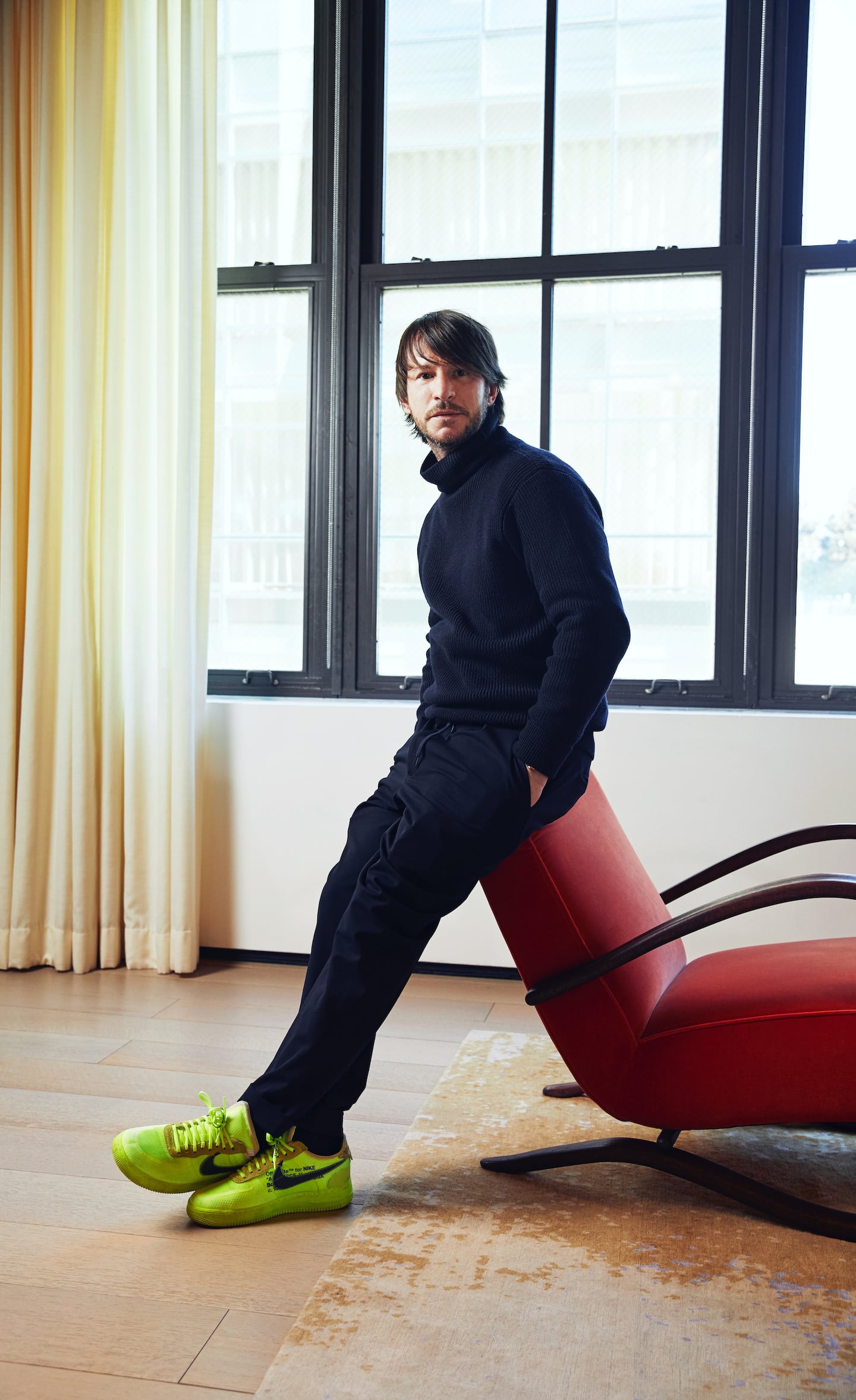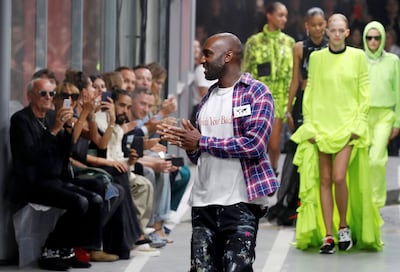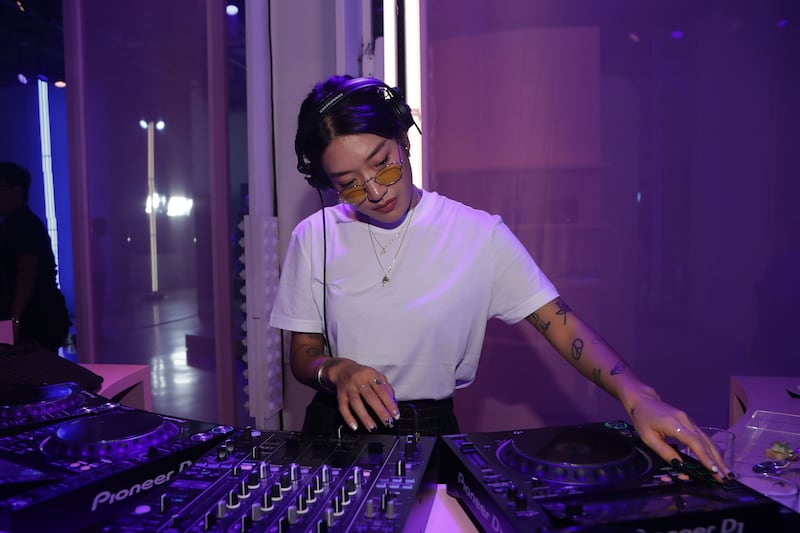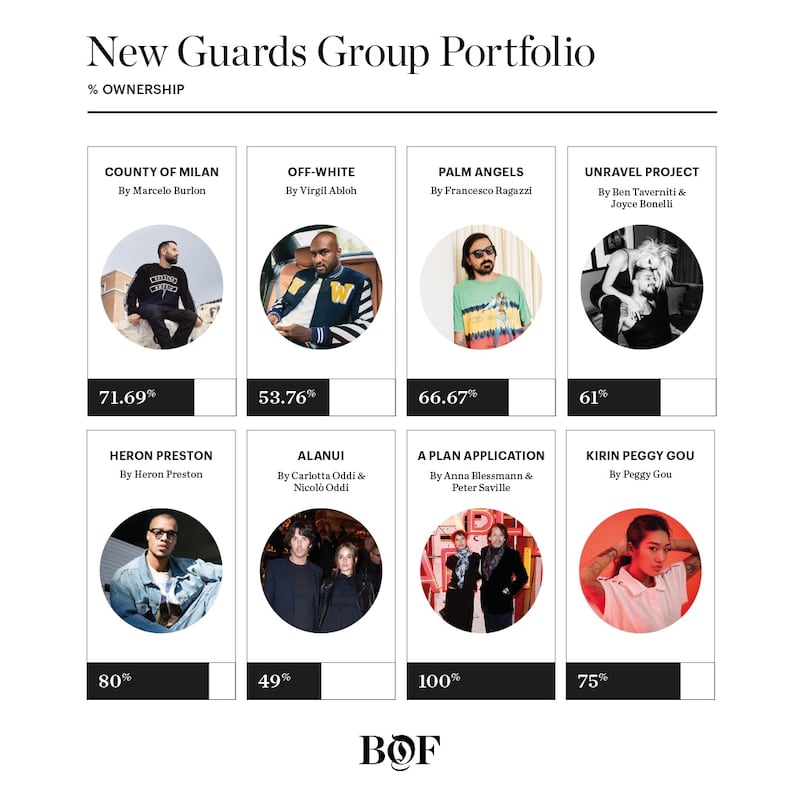
The Business of Fashion
Agenda-setting intelligence, analysis and advice for the global fashion community.

Agenda-setting intelligence, analysis and advice for the global fashion community.

Get the essential tools, templates and frameworks for successful entrepreneurship at BoF’s Start-Up School.
NEW YORK, United States — "I started from scratch; no money, no knowledge," recalls Davide De Giglio, the press-shy co-founder and mastermind of New Guards Group, the opaque Milanese holding company that has birthed many of luxury streetwear's most-hyped and successful brands, including Off-White, Palm Angels and Heron Preston.
De Giglio — whose sleek navy track pants and fluorescent "volt" green, Virgil Abloh-designed Nike Air Force 1s set him apart from most executives — has come to New York for meetings and a big-budget Palm Angels show, staged for the first time outside of Milan in a raw performance space in West Chelsea. But 22 years ago, he was hustling at a much smaller scale. "I moved to New York to start a business with $700 in my pocket," he says, gazing out the window at the grey and brown tones of the city that was his launchpad. "The word 'vintage' was everywhere, and I started buying used T-shirts and denim, then going back to Italy with a few bags and selling them to my friends."
When he had accumulated $20,000, the Italian architecture graduate-turned-scrappy fashion entrepreneur started printing his own T-shirts and, at the age of 22, launched a streetwear label called Vintage 55, which he later sold to Italian private equity firm DGPA Capital.
ADVERTISEMENT
"From the beginning, Davide had fire inside, that light," says Marcelo Burlon, the polymath Argentinian immigrant who also came from small beginnings, before befriending designer Riccardo Tisci, becoming famous as a DJ on Milan's party scene and teaming up with De Giglio and fashion retailing guru Claudio Antonioli to turn his then fledgling T-shirt label, inspired by his native Patagonia and '90s club culture, into a booming streetwear business.
I started from scratch; no money, no knowledge.
Marcelo Burlon County of Milan, launched in late 2012, was the first brand in what would become New Guards Group. But Burlon was anything but a traditional designer, and the practice of working with the likes of DJs and musicians who could assemble a community, instead of conventional fashion designers, was key to the group's success.
“When you work in the club scene, you understand the audience because you are part of them,” explains Burlon. “I’m not a brand. I’m a person who became a brand. We are not looking to a scene for inspiration. We are part of the scene. We know what the kids want, because we are the kids.”
The same is true of Abloh, the civil engineer and architect-turned-Kanye West creative director with whom New Guards Group launched Off-White in December 2014. Ditto Francesco Ragazzi, who partnered with De Giglio and Antonioli to birth Palm Angels in January 2015; and Heron Preston, who created his namesake label with New Guards Group in January 2017.
"We are closer to our generation," says Ragazzi. "There's a person behind the brand that talks the way they talk. Nothing is filtered. They are texting and DMing me… It's inspiring, it's my fuel. It's not just about beautiful clothes. It's more than fashion. It's a conversation." It's also smart business. "You understand the world from your followers," adds Ragazzi, who is also Moncler's artistic director. "You post a prototype and you know in one hour if it's going to sell."
New Guards is about a new way of doing things.
Equally critical to the company’s success is its WhatsApp-powered workflow (Abloh says his primary tool is a “fully charged iPhone” and calls his creative process “legit conversational”) and a revolutionary production platform that unites high-quality Italian manufacturing with the ability to move goods from conception to delivery in three weeks. This at a time when digital media is reshaping consumer expectation and the luxury market is thirsting for newness. “It’s like luxury fast fashion,” explains De Giglio.
Then, there's the company's global vision. Tellingly, Off-White's first store wasn't in one of the main four fashion capitals, but in Hong Kong. Indeed, New Guards Group is more likely to launch outlets in Manila, where Off-White also has a store, than in New York, Paris, London or Milan. But New Guards Group isn't just selling American and European brands to the rest of the world. It's increasingly selling international brands to a global audience. Earlier this month, the company launched a label called Kirin with Berlin-based, Korean techno DJ Peggy Gou, and plans to start more brands with Asian creatives in the near future. "It's one world already," says De Giglio, "and there's so much talent in Asia."
In 2018, New Guards Group generated €235 million in revenue and a net profit of €60 million, according to the company. The group is projected to hit €420 million in sales this year and has no debt. (It was able to self-finance growth by requiring a 30 percent deposit on retail orders.) Add to that a powerful stake in the luxury streetwear boom that has captured the collective imagination and pocketbooks of a new generation of millennial consumers, who have cultural roots in hip-hop and skateboarding, and are already the main growth engine of the luxury goods market, driving 85 percent of luxury expansion in 2017, according to Bain & Company.
ADVERTISEMENT
You can go fast. You just need to build a Ferrari.
No wonder there is market speculation that investors are eyeing the company, the vast majority of which is still owned by De Giglio and Antonioli, who each have 46 percent stakes in the business, with seven percent controlled by Burlon and a small stake held by chief commercial officer Andrea Grilli.
“They are profitable, have reached a significant size and are growing fast, making them an attractive target,” said luxury advisor Mario Ortelli. “They clearly understand where the market is going and have been impeccable with their execution.”
New Guards Group owns a majority stake in each of its labels, with the exception of Nicolò Oddi and his sister Carlotta’s emerging knitwear label Alanui. The group acquired a 49 percent stake in Alanui in December 2017 and controls the label via a shareholder agreement.
BoF’s Vikram Alexei Kansara sits down with De Giglio to discuss his entrepreneurship journey, the secrets to the success of New Guards Group and his long-term ambition to build Italy’s first major fashion conglomerate, with a modern business model born from today’s global and digital world.
BoF: Why did you decide to launch New Guards Group?
Davide De Giglio: It began with Marcelo Burlon. He had become famous in Milan as a PR and a DJ. At the time, he was very close to Riccardo Tisci; they were like brothers. And Claudio came to me saying Marcelo had this idea for a T-shirt collection. But it wasn’t really about T-shirts; the way he wanted to communicate was with an iPhone, because, he said, “Kids in the future are going to use only this.” That was the time of Myspace, Facebook, the beginnings of Instagram.
He said, “This industry is changing.” I felt the same. I’m coming from sportswear, not the fashion industry with a capital F. And then, the prints he had in mind for the T-shirts were new: like trying to print 360 degrees. Because I have an industrial background, I said, “Ah, this is a challenge.” So, we began working and after three months, boom, it was a real company. We started by seeding a lot of T-shirts to celebrities, musicians and artists all over the world — Marcelo’s friends — and this helped a lot to build a community.

Virgil Abloh at Off-White’s Spring/Summer 2019 show | Source: Getty Images
ADVERTISEMENT
Off-White has been your most successful brand. How did you first meet Virgil?
One of my friends, Andrea Grilli, who previously worked for Balmain and Dolce & Gabbana, and is now one of our partners, called me saying, "I'm working with Kanye West to build his first fashion brand." So, I had a few appointments with Kanye, who's a genius. But I also realised there was this guy Virgil next to him; always calm and very sweet. Marcelo was close to Virgil and I said, "Why don't you ask Virgil if we can do something together, because I think he has a vision." So, we had a coffee in New York. At the time, he was printing Ralph Lauren shirts with "Pyrex" and then the numbers "23" and "13" on the back. I said, "If you want to elevate your message and you don't want to just be another streetwear brand, we need to choose the best cotton, the best print technique, the best Italian factories." We started Off-White from scratch.
What’s the common thread that runs through your portfolio of brands?
The common thread is the individual, before anything else. I never use the word designer. I call them directors. Each of them has a vision. They are able to do a lot of things. Marcelo is going to be on tour with Loco Dice just because he wanted to play music for a while. Francesco Ragazzi of Palm Angels is involved with art; Heron Preston, too. How do we pick them? Sometimes it’s organic, like Heron was Virgil’s friend. Francesco is also Moncler’s art director and when we did a co-branding thing with Marcelo, he showed me his first book. He was comparing the angels of Giotto with the angels of Los Angeles, and the pictures had a fashion eye. So, I said, “Look, you have a vision. You have taste. You’ve got a nice name: Palm Angels. I like the logo. Let’s start a brand.” We started Palm Angels like that. We started like eight brands in less than three years.
I’m not against designers; I love designers. But these guys are good communicators. They’re not shy, they’re artists and they have the ability to build a community: a group of people that wants to be part of something. Virgil is there with the kids when there’s a store opening somewhere in the world. He’s signing sneakers, talking to the kids, taking pictures. This is very important.
Last night at the Palm Angels show, I met a guy from Costa Rica who is living in Italy. Francesco gave 20 invitations to the show through Instagram and this guy received one, took a plane just to see the show in New York and went back this morning. I was like, “How do you have this passion? Are you crazy?” And he said, “You don’t understand what this means to me. I had the possibility to be part of something that I love. I was blessed, so I got a plane.”
Some say the streetwear trend is waning.
I think streetwear is much deeper than a trend. This is our generation. Me, Francesco, Heron, Marcelo, Virgil… we were all skaters when we were kids. But it’s bigger than that. Today, you can be elegant and cool in a nice sneaker and sweater instead of a suit. This is just the new way of dressing, even for executives. I’m an executive and I’m wearing sneakers. I read something the other day about “the streetwear bubble.” I don’t think it’s a bubble.
But in any case, New Guards Group is not a streetwear group. The one label we acquired, Alanui, is a cashmere brand that’s pretty expensive and not streetwear. New Guards Group is about a new way of doing things: a new way of making, a new way of communicating, a new way of distributing. In the same way that none of our creative directors are really designers, we designed 200 collections in 2018. For this, you need a different machine. We move fast and think big.
Today’s consumers crave newness at the pace of Instagram.
Exactly. Nowadays, it’s not possible to wait a few months to get what you see. They want it now. So, we have to deliver. And to make that happen, we had to change the way we work. Look, I have 20,000 unread emails. But just now I got 12 WhatsApp messages. This is the way I work now. We all work through WhatsApp, because we work fast and we can’t wait five hours, eight hours for answers. It stops the flow, the process. We design collections through WhatsApp. Has Virgil showed you before? It’s the only way to work with Heron in New York, Ben in Los Angeles, Virgil in Paris and everywhere; Marcelo, everywhere. Francesco, everywhere; Peggy, everywhere. We have delivery tasks and our timelines are short. Most of our kids, they’re like 25 years old, so they’re having fun, they’re single, they’re working 24/7, they’re in the club answering WhatsApp. We create a chat for each topic, like sunglasses. I have 1,000 chats. It’s much faster. It’s real time.
And the back-end? How does it work?
As I said, we designed 200 collections in 2018. How could it be possible to design so many collections? Well, you need to have someone next to you that is fast as well, so we asked our industrial partners to build something just for us. We have some companies now working with us 24/7 in fours shifts, delivering stuff overnight. We can go from design to delivery within three weeks for T-shirts, but also for sneakers and leather goods. It’s like luxury fast-fashion.
Of course, you can’t do absolutely anything. I give the creative directors certain ingredients, they are the chefs. We give them fabrics, prints, embroideries, buttons, zips and product managers who are very close to the creative directors — and they cook. If I give you tomatoes, basil, onion, oil and spaghetti — even if we have the same ingredients — my dish is going to be different.
How is the company structured? And how do you manage the brands?
There is a holding level called New Guards Group and then we have the brands and every creative director has a stake in their label, so Virgil is part of Off-White, Marcelo is part of County of Milan, Francesco is part of Palm Angels. They’re all partners. And I’m like 50 percent therapist, 50 percent personal assistant. I just try to make things happen. If Virgil wants fragrances, I’ll find the team, I’ll find the network. If Francesco wants to show in New York, okay, let’s talk to producers, scout the location, send the team. This is my job.
Claudio was taking care of sales. Now, we have Andrea, also our partner, in charge of retail and wholesale. It’s very organic, we’re all friends. We all have a tattoo. We’re part of a group. But the brands are run 100 percent separately. They have different teams, different companies, but they share some logistics, administration, finance — and then the production side.
How do you plan to grow?
We’re planning to grow in different ways. We’re very, very curious to explore new ways of retail. But you know what’s my dream? I would like to expand my business in Africa. This is something that I’m obsessed with. It’s a niche market but it can be a big market. You know, talking to Virgil, talking to [South African DJ] Black Coffee, listening to what’s happening there. I’m more into opening stores somewhere like Africa than Milan. Look at what’s happening in Manila or in Kuala Lumpur or in Melbourne. It’s such a big, big opportunity.

Peggy Gou DJ-ing in Seoul, South Korea | Source: Getty Images
Most of your brands are still European and American. Is that set to shift?
We’re launching Peggy Gou, who’s Korean. We’re also about to start a Japanese brand and a Chinese brand. So, this is very, very important for us. It’s about thinking big and differently. In a classic fashion brand, if you wanted to start eyewear or fragrance or cosmetics, you had to wait until after your brand was established. You know, then you opened a retail store, and if you’re from Milan, then you opened the store in Milan, or you opened in Paris, London, New York. Forget it. This is not our way. You have an idea, like Heron had this big idea of making a new fragrance and I backed him. We opened the first store for Off-White after six months — and it was in Hong Kong, not in Milan or New York or Chicago, Virgil’s hometown.
Today, I was talking to Andrea and he was saying, “I have to go to Hanoi in Vietnam, because we studied social media and it’s telling us we have a chance to open a store there.” I’ve got eight brands and not one store in Milan. Instead, it’s Manila, Jakarta, Kuala Lumpur, Melbourne. I’m currently developing two small factories: one in Indonesia, one in China for sneakers. And it is not because China and Indonesia are cheaper than Italy; it’s because the best technology is there and it’s no longer in my country. We have people working with us in New Zealand. Marcelo had a graphic designer in Sydney. Our shoe designers are in Amsterdam.
Do you plan to sell some of the brands you have birthed?
I’m not planning to sell. This is what I’m doing. I’m forty-something, I would love to do this for the rest of my life, I’m having fun. But probably, if we want to go to the next step, we would need a partner. This company, next year, is going to be a €500 million business. So, we’re not small anymore. To build a group, we might probably need someone. Having said that, we’re one hundred percent independent. This is a wealthy company.
What are you looking for in a partner?
If you’re not looking for money, you’re looking for expertise, support, someone that can help you to grow, someone that is able to tell you, “Oh we did it that way, or maybe it’s better to do it in another way.” Someone that is smart enough to understand that we have something that they don’t have, and that they have something that we don’t have. We need the right partner that can complete what we’re doing. I would love to have offices and factories all over the world. It’s easy for me to open a T-shirt factory. But to open a headquarters in Africa, it’s different.
There is speculation that you are in talks with LVMH.
I was amazed by this. I was talking to them. We have a very good relationship. When I’m going there, I’m learning. And this is very important. We have a very good relationship with Louis Vuitton because of Virgil. But we were both amazed by the [speculation] … Because you know, the leaking was also in numbers and things and so on. And I don’t really know how.

NGG Brand Portfolio | Source: Courtesy
What are the biggest lessons you’ve learned along the way?
With my first brand, after a few years, I opened 22 stores in China. I said, “Okay, things are up and running, let’s conquer the world.” But I had to sell the company to a private equity firm because I needed the cash injection; the company was growing too fast. I’m still obsessed with that story. At New Guards Group, we have zero debt, cash positive in every brand, no banks, our money, very healthy. But the lesson isn’t about going slow. You can go fast. You just can’t go fast with a Fiat Panda. You need to build a Ferrari. It’s all about experience. And then you push yourself to the limit. You know I still receive messages at 3am, 4am. I know what it means to travel 320 days per year, not being next to your friends, your family. It’s hard. It’s stressful because you are multitasking. But it’s also fun. It’s not a sacrifice.
What’s next for New Guards Group?
Look at the French: they have big fashion groups. There is not one Italian company like this. This is something that I see: to be an Italian company capable of building something. Italians have a thousand years of experience in making clothes. It’s in our DNA. And being in Milan is very helpful because we have factories. If you’re a kid in Saint Petersburg and you want to start your own fashion label, it’s hard. The infrastructure is not there. We have the infrastructure. So, thinking about an upcoming Korean brand like Peggy Gou. She puts what she has — her culture — with our culture. New Guards Group is not a maison or something. It’s a platform.

Related Articles:
[ Virgil Abloh: ‘I Am Not a Designer’Opens in new window ]
[ How Marcelo Burlon Built County of MilanOpens in new window ]
[ The New Luxury: How Streetwear Changes EverythingOpens in new window ]
The Swiss watch sector’s slide appears to be more pronounced than the wider luxury slowdown, but industry insiders and analysts urge perspective.
The LVMH-linked firm is betting its $545 million stake in the Italian shoemaker will yield the double-digit returns private equity typically seeks.
The Coach owner’s results will provide another opportunity to stick up for its acquisition of rival Capri. And the Met Gala will do its best to ignore the TikTok ban and labour strife at Conde Nast.
The former CFDA president sat down with BoF founder and editor-in-chief Imran Amed to discuss his remarkable life and career and how big business has changed the fashion industry.